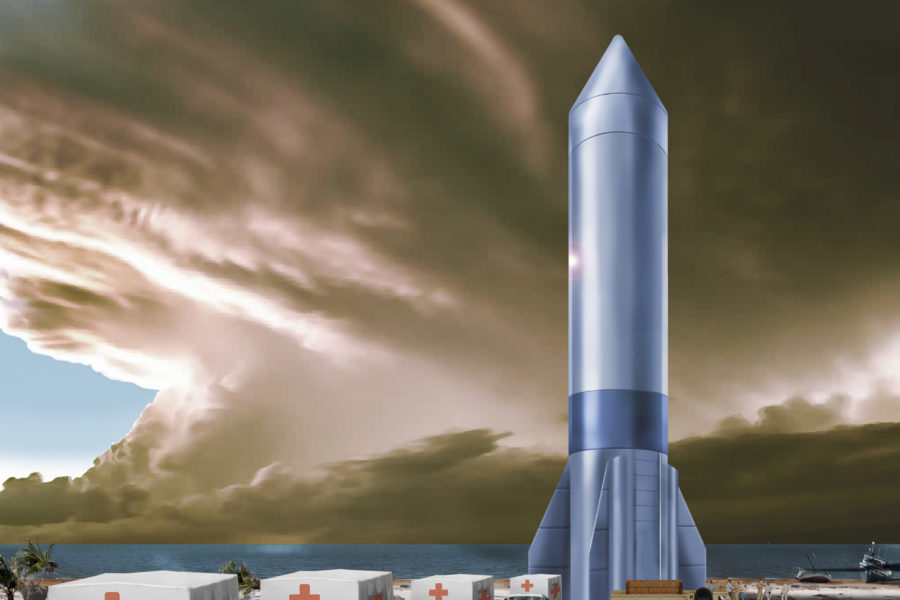Reports of production troubles on the SpaceX rocket that could contend for military cargo deliveries happened to coincide with a different company’s concept receiving an early nod—one that might not require a rocket at all.
Text of an email reportedly by SpaceX CEO Elon Musk to employees, first published by the website Space Explored, acknowledged a “production crisis” involving the company’s Raptor engines built to power both its in-development Starship space vehicle and the Super Heavy booster to launch it. SpaceX is still testing both, so Starship hasn’t gone to space yet.
“The consequences for SpaceX if we can not get enough reliable Raptors made is that we then can’t fly Starship,” Musk reportedly wrote.
SpaceX didn’t respond to a query by Air Force Magazine asking to confirm the email contents or to comment on how a “genuine risk of bankruptcy” cited in the email might affect the company’s military business under the National Security Space Launch program. The company hadn’t publicly disputed the email contents by press time.
An illustration depicting the Air Force Research Laboratory’s Rocket Cargo “Vanguard” concept shows a vehicle that resembles Starship, which sources have pointed out could fit the bill in regularly getting cargo aloft because of the reusability of its design. AFRL seeks only to prove whether “rocket-based transportation is viable, affordable, and advantageous for agile global DOD logistics,” according to the solicitation.
In an emailed statement Dec. 2, AFRL’s Rocket Cargo program manager Greg Spanjers said AFRL is “actively seeking to work with the broadest possible industry base.” According to the solicitation, the program is “solely focused on leveraging commercial rocket capabilities as a leased service.”
Meanwhile, the same day, the lab announced at the conclusion of its Hyperspace Challenge another concept that had already caught its eye. California-based startup Varda Space Industries won first place, among 13 startups chosen to compete, in part for its concept answering the contest’s “mission need” of “rocket cargo technology for agile global logistics.”
This year’s Hyperspace Challenge invited 13 startups and 11 universities to compete in pitching ideas for six mission needs. Varda’s idea for rocket cargo: “affordable payload capsules”—borrowing existing NASA designs—“to be deployed from hypersonic vehicles,” according to the news release announcing winners. The company’s focus is on building “the world’s first commercial zero-gravity industrial park.”
In an email to Air Force Magazine, Muk Pandian, who works in business development for Varda Space Industries, said its capsules—designed to return from orbit at Mach 22—could “conceivably be launched from any aircraft.”
The original announcement of the Hyperspace Challenge said the most viable concepts would receive the contest’s $100,000 “in cash prizes … to expedite follow-on activities related to establishing government acquisition contracting opportunities.”
Hyperspace Challenge Winners (Startups):
- First place: Varda Space Industries, Torrance, Calif., for “addressing orbital manufacturing and down mass needs with orbital return capsules. Looking to solve pressing rocket cargo challenges, the technology will provide affordable payload capsules to be deployed from hypersonic vehicles,” according to the news release.
- Second place: Scout, Alexandria, Va., for “working to provide better in-space situational awareness through their … space-based optical sensor and computer payload system build for collision avoidance and in-space object detection.”
- Third place: Neutron Star Systems USA Corp., Cologne, Germany, for “developing superconductor-based electric propulsion systems that deliver greater efficiency, scalability, and operational flexibility for applications that range from satellite refueling and maintenance to debris removal and decommissioning.”
Hyperspace Challenge Winners (Universities):
- First place: Stevens Institute of Technology, Hoboken, N.J., for “developing an [artificial intelligence]-driven edge computing router that provides timely mission-critical data and information to terrestrial first responders in emergency environments and has the potential to assist space responders in accurately sensing, detecting, and tracking the growing number of space objects.”
- Second place: SUNY Polytechnic Institute, Albany, N.Y., for building “computer brains with a ReRAM Memristor synapse technology created to handle and process information that will assist in the automation of on-orbit servicing, assembly, and manufacturing.”
- Third place: Texas State University, San Marcos, Texas, for exploring “the effects of vibration during micro-gravity production of ZBLAN, a heavy-metal fluoride glass, and the potential telecommunication, sensor, and power-transmission applications for the material.
